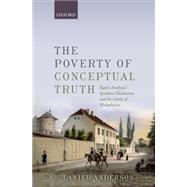The Poverty of Conceptual Truth Kant's Analytic/Synthetic Distinction and the Limits of Metaphysics
, by Anderson, R. Lanier- ISBN: 9780198724575 | 0198724578
- Cover: Hardcover
- Copyright: 3/23/2015
The Poverty of Conceptual Truth is based on a simple idea. Kant's distinction between analytic and synthetic judgments underwrites a powerful argument against the metaphysical program of his Leibnizian-Wolffian predecessors--an argument from fundamental limits on its expressive power. In that tradition, metaphysics promised to reveal the deep rational structure of the world through a systematic philosophy consisting of strictly conceptual truths, which flow from a logically perspicuous relation of 'containment' among concepts. That is, all truths would be 'analytic,' in Kant's sense. Kant's distinction shows to the contrary that far reaching and scientifically indispensable parts of our knowledge of the world (including mathematics, the foundations of natural science, all knowledge from experience, and the central principles of metaphysics itself) are essentially synthetic and could never be restated in analytic form. Thus, the metaphysics of Kant's predecessors is doomed, because knowledge crucial to any adequate theory of the world cannot even be expressed in the idiom to which it restricts itself (and which was the basis of its claim to provide a transparently rational account of things). Traditional metaphysics founders on the expressive poverty of conceptual truth.
To establish these claims, R. Lanier Anderson shows how Kant's distinction can be given a clear basis within traditional logic, and traces Kant's long, difficult path to discovering it. Once analyticity is framed in clear logical terms, it is possible to reconstruct compelling arguments that elementary mathematics must be synthetic, and then to show how similar considerations about irreducible syntheticity animate Kant's famous arguments against traditional metaphysics in the Critique of Pure Reason.
To establish these claims, R. Lanier Anderson shows how Kant's distinction can be given a clear basis within traditional logic, and traces Kant's long, difficult path to discovering it. Once analyticity is framed in clear logical terms, it is possible to reconstruct compelling arguments that elementary mathematics must be synthetic, and then to show how similar considerations about irreducible syntheticity animate Kant's famous arguments against traditional metaphysics in the Critique of Pure Reason.







